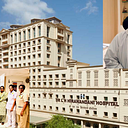Common Kidney Problems and Their Warning Signs — Hiranandani Hospital Kidney
Kidneys are vital organs that play a crucial role in filtering waste products and excess fluids from the blood, regulating blood pressure, and maintaining electrolyte balance. Kidney problems can be subtle and may go unnoticed until they reach an advanced stage. To protect your kidney health, it’s essential to be aware of common kidney problems and their early warning signs. In this blog, we’ll explore some of these issues and help you recognize when it’s time to seek medical attention.
Common Kidney Problems
Chronic Kidney Disease (CKD):
- Chronic Kidney Disease is a progressive condition where the kidneys gradually lose their function over time. It’s often asymptomatic in its early stages, making regular check-ups essential. Some common symptoms and risk factors include:
- Warning Signs: Fatigue, swelling in the ankles and legs, frequent urination, blood in the urine, and high blood pressure.
- Risk Factors: Diabetes, high blood pressure, family history of kidney disease, and smoking.
Kidney Stones:
- Kidney stones are hard deposits of minerals and salts that can form in the kidneys. When these stones move into the urinary tract, they can cause severe pain. Warning signs include:
- Warning Signs: Sharp pain in the back, side, or lower abdomen, pain during urination, cloudy or foul-smelling urine, and blood in the urine.
- Risk Factors: Dehydration, diet high in sodium and oxalate, family history, and certain medical conditions.
Urinary Tract Infections (UTIs):
- UTIs are infections that can affect the kidneys, bladder, or urethra. Left untreated, they can lead to kidney infections, which are more severe and can cause kidney damage. Common signs of UTIs are:
- Warning Signs: Frequent, painful urination, cloudy, bloody, or strong-smelling urine, and lower abdominal pain.
- Risk Factors: Sexual activity, pregnancy, urinary tract abnormalities, and urinary catheter use.
Polycystic Kidney Disease (PKD):
- PKD is a genetic condition in which cysts develop and grow in the kidneys. Over time, these cysts can impair kidney function. Hiranandani hospital kidney care stated that Common signs include:
- Warning Signs: Pain in the back or sides, blood in the urine, and frequent kidney infections.
- Risk Factors: Family history of PKD, as it is an inherited condition.
Detecting Kidney Problems: The Importance of Warning Signs
Detecting kidney problems in their early stages is crucial for successful management and treatment. Often, the symptoms are subtle, and people may mistake them for other health issues. Here are some general warning signs to look out for:
- Changes in Urination: Any sudden or significant changes in urination patterns should raise concern. This includes increased frequency, blood in the urine, foamy or bubbly urine, and difficulties in urination.
- Swelling: Kidneys play a vital role in maintaining the body’s fluid balance. If they are not functioning correctly, you may notice swelling in the hands, face, legs, and ankles due to fluid retention.
- Back Pain: Persistent pain in the back, on one or both sides, can be a sign of kidney problems, especially if it’s accompanied by other symptoms.
- High Blood Pressure: Kidneys help regulate blood pressure. High blood pressure can both be a cause and a consequence of kidney problems. Regular blood pressure checks are essential.
- Nausea and Vomiting: Kidney problems can lead to a buildup of waste in the blood, causing nausea and vomiting.
When to Seek Medical Attention
If you notice any of these warning signs, it’s essential to consult a healthcare professional promptly. Early detection and intervention can significantly improve the outcome of kidney problems. When you visit a doctor, they may perform various tests, including blood tests, urine tests, imaging scans, and biopsies to determine the cause and severity of the issue, says Hiranandani Hospital Kidney Transplant department.
Preventing Kidney Problems
Prevention is always better than cure, and there are several steps you can take to promote kidney health:
- Stay Hydrated: Drinking plenty of water helps prevent kidney stone formation and ensures proper kidney function.
- Maintain a Healthy Diet: A diet low in salt, saturated fat, and processed foods can help protect your kidneys. Include fresh fruits, vegetables, and whole grains in your diet.
- Control Blood Pressure and Diabetes: If you have these conditions, work with your healthcare provider to manage them effectively.
- Limit Alcohol and Caffeine: Excessive alcohol and caffeine intake can strain your kidneys. Moderation is key.
- Avoid Smoking: Smoking can increase your risk of kidney disease, so quitting is highly recommended.
- Exercise Regularly: Regular physical activity helps maintain overall health, including kidney health.
Conclusion
As per Hiranandani Hospital Kidney, Understanding common kidney problems and their warning signs is the first step toward maintaining good kidney health. Kidney diseases can be silent killers, but with early detection and appropriate management, you can protect your kidneys and enjoy a healthier life. Remember to stay informed, make healthy lifestyle choices, and seek medical attention if you notice any warning signs of kidney problems. Your kidneys are essential, and taking care of them is a crucial aspect of your overall well-being.
